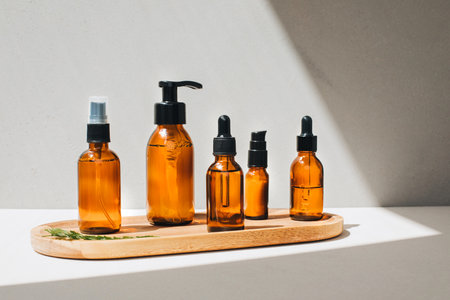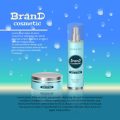Introduction to Organic Skincare in the UK
The demand for organic skincare is flourishing across the UK, as British consumers become increasingly conscious of what they put on their skin. This shift is fuelled by a desire for transparency, purity, and sustainability in beauty routines—a trend that aligns perfectly with the British appreciation for quality and eco-friendliness. But what does ‘organic’ really mean in the context of skincare? In the UK, an ‘organic’ label signifies products made from ingredients grown without synthetic pesticides, fertilisers, or genetically modified organisms (GMOs). These standards are not just marketing buzzwords; they are governed by stringent UK and EU regulations designed to protect both consumers and the environment.
Understanding ‘Organic’: The British Perspective
For British shoppers, choosing organic isn’t simply about avoiding chemicals—it’s about embracing a holistic approach to health and wellbeing. With rising awareness around ingredient safety and environmental impact, many are opting for brands that prioritise ethical sourcing and cruelty-free practices.
Key Regulatory Bodies and Standards
| Regulatory Body | Main Role |
|---|---|
| Soil Association | Certifies organic ingredients and finished products, ensuring strict compliance with organic farming and processing standards. |
| COSMOS-standard AISBL | Sets harmonised European requirements for organic and natural cosmetics, recognised across the UK. |
How Regulations Shape the Market
UK law ensures that any product marketed as organic contains a high percentage of certified organic ingredients. Misleading claims are closely monitored, which gives consumers confidence when choosing certified brands. As a result, the British organic skincare market is recognised for its integrity—making it one of the most trusted in Europe. As you explore this comprehensive guide, you’ll discover which ingredients meet these rigorous standards and why they’re winning favour among UK beauty enthusiasts.
2. Must-Have Organic Ingredients and Their Benefits
When it comes to organic skincare in the UK, certain ingredients stand out for their efficacy, natural origins, and local popularity. British consumers have shown a clear preference for botanicals that not only deliver visible results but also echo the nation’s heritage of herbal remedies and countryside wellness. Below, we highlight three key organic skincare ingredients—rosehip oil, chamomile, and sea buckthorn—that have become staples in British beauty routines.
Rosehip Oil: The Cult Classic
Rosehip oil is extracted from the seeds of wild rose bushes commonly found across the UK, particularly in hedgerows and gardens. This golden elixir is rich in vitamins A and C, essential fatty acids, and antioxidants. Its lightweight texture appeals to all skin types, making it a versatile addition to both daily and nightly regimens.
Key Benefits:
- Reduces the appearance of scars and pigmentation
- Supports skin cell regeneration and elasticity
- Deeply hydrates without clogging pores
Why Brits Love It:
The UK’s often damp climate can leave skin feeling dull or dehydrated; rosehip oil provides a gentle yet potent remedy, supporting a naturally radiant complexion while aligning with local values of sustainability and tradition.
Chamomile: Soothing Heritage Herb
Chamomile has deep roots in British folk medicine, often sipped as tea or used topically for its calming effects. In skincare, chamomile extract is prized for its anti-inflammatory properties and ability to soothe sensitive or irritated complexions.
Key Benefits:
- Calms redness and irritation
- Promotes skin healing and comfort
- Packed with antioxidants to fight environmental stressors
Why Brits Love It:
The gentle nature of chamomile makes it ideal for classic English skin concerns such as sensitivity due to weather changes or urban pollution. Its familiar scent also evokes comfort and relaxation—a nod to British teatime culture.
Sea Buckthorn: The Coastal Powerhouse
Grown along Britain’s coastal regions, sea buckthorn berries are a vibrant source of omega-7 fatty acids, vitamin E, and carotenoids. This powerhouse ingredient is becoming increasingly popular in UK organic skincare thanks to its restorative and protective properties.
Key Benefits:
- Nourishes dry or mature skin
- Boosts collagen production for plumper skin
- Shields against free radical damage from urban environments
Why Brits Love It:
The unique coastal provenance of sea buckthorn resonates with Britons who value locally-sourced, eco-friendly ingredients. Its ability to combat dryness fits perfectly with the UK’s often brisk winds and cold spells.
At-a-Glance Comparison Table
| Ingredient | Main Benefit | Local Resonance |
|---|---|---|
| Rosehip Oil | Evens tone & hydrates | Locally abundant; sustainable tradition |
| Chamomile | Soothes sensitivity | Ties to heritage & comfort rituals |
| Sea Buckthorn | Nourishes & protects | Coastal sourcing; eco-conscious choice |
Together, these must-have organic ingredients offer British consumers effective options tailored to their unique climate and cultural preferences, making them enduring favourites on the UK skincare scene.

3. How UK Brands Are Leading the Organic Skincare Movement
The United Kingdom has become a pioneer in the organic skincare sector, with British brands setting benchmarks for quality, transparency, and sustainability. These homegrown companies have been instrumental in shifting consumer habits towards ethical consumption by championing the use of certified organic ingredients, responsible sourcing practices, and eco-friendly packaging. Their influence extends beyond product formulation to encompass brand values that resonate with increasingly conscious UK consumers.
Spotlight on Influential British Organic Skincare Brands
| Brand | Core Organic Focus | Ethical & Sustainable Practices |
|---|---|---|
| Neal’s Yard Remedies | Certified organic botanicals and essential oils | Carbon-neutral operations, recyclable packaging, cruelty-free certification |
| Pai Skincare | Organic plant extracts suitable for sensitive skin | Vegan formulas, traceable ingredient sourcing, Soil Association approval |
| Aurelia London | BioOrganic ingredients such as baobab and hibiscus | Probiotic innovation, responsible supply chain management |
| Bamford | British-grown organic herbs and flowers | Biodynamic farming support, reusable glass packaging, B Corp status |
Setting New Standards for Ingredient Transparency
UK brands are at the forefront of ingredient transparency, often providing full disclosure of sources and certifications right on their packaging or websites. Many lead with certifications from Soil Association or COSMOS to give consumers confidence in their choices. This openness builds trust and encourages other industry players to follow suit.
Sustainable Sourcing & Consumer Impact
These brands prioritise not only what goes into their products but also how those ingredients are sourced. By working with local farmers or supporting fair trade cooperatives abroad, they ensure their supply chains respect both people and planet. As a result, British shoppers are becoming more discerning—valuing provenance, purity, and ethics as much as efficacy when selecting skincare solutions.
The Ripple Effect on UK Consumer Preferences
The success of these pioneering brands has shifted mainstream expectations across the beauty market. Today’s UK consumers are more likely to read labels, seek out sustainable options, and reward brands that align with their environmental and ethical values. In turn, this growing demand is encouraging both established and emerging skincare companies to embrace the organic movement wholeheartedly.
4. Navigating Labels and Certifications: What to Look For
When it comes to organic skincare in the UK, understanding product labels and certifications is crucial for making confident, informed choices. The British market has its own set of standards and trusted organisations that help consumers differentiate between genuinely organic products and those that simply use “green” marketing language. Here’s how you can decode what’s on your skincare packaging:
Key UK Organic Certifications
| Certification | Organisation | What It Means |
|---|---|---|
| Soil Association Organic | Soil Association | Products must contain at least 95% organic ingredients (excluding water and minerals). Strict regulations on synthetic chemicals, animal testing, and GMOs. |
| Cosmos Organic | COSMOS-standard AISBL (includes Soil Association & Ecocert) | Ensures sustainable sourcing, at least 95% of physically processed agro-ingredients are organic, environmentally-friendly manufacturing processes. |
| The Vegan Trademark | The Vegan Society | No animal ingredients or testing. Not exclusive to organic but commonly seen on ethical skincare brands. |
| Leaping Bunny | Cruelty Free International | No animal testing throughout the supply chain. Often paired with organic certifications for cruelty-free assurance. |
Common Terms on Labels: What Do They Really Mean?
| Term | UK Meaning/Regulation | What to Watch Out For |
|---|---|---|
| Organic | Must meet strict certification standards (e.g., Soil Association or COSMOS). | If not certified, “organic” may refer to only a small percentage of ingredients. |
| Natural | No legal definition; often means some ingredients are plant-derived. | Lack of regulation—check ingredient list and look for certifications. |
| Sustainable/Sustainably Sourced | No specific UK legal definition in skincare. | This can be a marketing term unless backed by a recognised certification. |
| Hypoallergenic/Non-comedogenic | No standardised testing required in the UK. | These claims do not guarantee suitability for sensitive skin; always patch test. |
Tips for Making Informed Choices in the UK Market:
- Look for recognisable logos: Always check for official certification logos such as Soil Association or COSMOS on your packaging—these offer assurance of authentic organic standards.
- Read the ingredient list: In the UK, ingredients must be listed in descending order of concentration. Avoid products where “aqua” (water) is the main component unless hydration is your priority.
- Avoid greenwashing: Don’t be swayed by packaging colours or vague terms like “eco-friendly.” Seek clear evidence of third-party verification.
Your Confidence Checklist:
- Check for at least one recognised UK/EU certification logo.
- Avoid products with long lists of unrecognisable chemical names if you prefer purer formulas.
- If vegan or cruelty-free status matters to you, seek out Leaping Bunny or Vegan Society marks alongside organic labels.
Navigating labels is an essential part of embracing organic skincare in Britain. By recognising reputable certifications and understanding common terminology, you can shop smarter and feel confident that your routine aligns with your values and the latest industry standards.
5. Popular DIY Organic Skincare Trends in the UK
Across the UK, homemade organic skincare has become a beloved ritual, blending British creativity with a passion for natural beauty. From kitchen-cupboard staples to locally sourced botanicals, these trending recipes and rituals celebrate self-care and sustainability. Here’s an expert look at what’s gaining popularity among British skincare enthusiasts, alongside essential safety tips for effective at-home use.
Trending DIY Skincare Recipes
| Recipe Name | Main Ingredients | Benefits |
|---|---|---|
| Oat & Honey Soothing Mask | Scottish oats, organic honey, chamomile tea | Calms sensitive skin, gently exfoliates, hydrates |
| Cucumber & Mint Eye Gel | Fresh cucumber, English mint leaves, aloe vera gel | Reduces puffiness, soothes tired eyes, refreshes |
| Bramley Apple Facial Scrub | Bramley apple puree, brown sugar, rosehip oil | Brightens complexion, smooths texture, nourishes with vitamins |
| Elderflower Toning Mist | Elderflower infusion, witch hazel, lavender essential oil | Tightens pores, balances skin tone, uplifts mood |
| Seaweed & Clay Detox Mask | Cornish seaweed powder, green clay, spring water | Purifies pores, remineralises skin, controls oiliness |
Popular Rituals & British Influences
- Aromatherapy Facial Steams: Using native herbs like rosemary and thyme for a spa-like experience at home.
- Seasonal Ingredient Swaps: Incorporating berries in summer or root vegetables in winter to align with local harvests.
- Sustainable Packaging: Upcycling jam jars and ceramic pots for storage—an eco-friendly nod to classic British thriftiness.
Tips for Safe and Effective At-Home Use
- Patch Test First: Always test new blends on a small area behind your ear before full application.
- Select Fresh Ingredients: Use locally sourced and organic produce where possible to maximise benefits and reduce irritation risks.
- Avoid Essential Oil Overuse: British-made essential oils are potent; add only a drop or two to avoid sensitising the skin.
The Takeaway: Blending Tradition with Modern Wellness
The UK’s love affair with DIY organic skincare is rooted in tradition but flourishes through contemporary trends—making it accessible, enjoyable, and tailored to every skin type. With careful selection of ingredients and adherence to simple safety guidelines, everyone can indulge in these cherished rituals for radiant British beauty.
6. Challenges and Future of Organic Skincare in the UK
The organic skincare sector in the UK is flourishing, but not without its hurdles. As British consumers become increasingly discerning about what they put on their skin, brands face ongoing challenges related to ingredient sourcing, authenticity, and price. Yet, the future remains promising with innovation and heightened consumer awareness driving the industry forward.
Sourcing and Authenticity: Upholding Standards
One of the key challenges is ensuring a consistent supply of high-quality, certified organic ingredients. The unpredictable British climate can impact local harvests, forcing brands to source globally, which raises concerns about sustainability and traceability. Additionally, “greenwashing”—when products are misleadingly marketed as organic—undermines consumer trust. Strict certification from bodies such as The Soil Association helps maintain credibility but requires rigorous compliance.
Comparison of Sourcing Challenges
| Challenge | Impact on Brands | Impact on Consumers |
|---|---|---|
| Climate Variability | Inconsistent supply; higher costs | Potential price increases |
| Global Sourcing | Complex logistics; ethical concerns | Transparency issues |
| Certification Requirements | Bureaucratic burden; added expenses | Greater confidence in product quality |
Pricing: The Cost of Purity
Organic skincare often comes at a premium due to the expense of ethical sourcing, sustainable farming methods, and independent certification. While some UK consumers are willing to invest in quality, others find these products out of reach compared to conventional alternatives. This price gap remains a significant barrier to widespread adoption.
The Bright Future: Innovation & Consumer Awareness
The outlook for organic skincare in the UK is optimistic. Advancements in green chemistry and biotechnological extraction methods are paving the way for more effective and sustainable formulations. At the same time, British shoppers are becoming more informed—driven by social media, educational campaigns, and a collective push towards wellness and environmental stewardship.
Key Trends Shaping the Future
- Circular Beauty: Brands are embracing upcycled ingredients and refillable packaging to reduce waste.
- Local Sourcing Initiatives: There’s a growing preference for homegrown botanicals like English lavender and rosehip.
- Transparency Tech: Blockchain and QR codes enable consumers to trace ingredients back to their origin.
- Diversity & Inclusion: Formulations tailored for diverse skin tones and types are gaining prominence.
As regulatory frameworks evolve and technology advances, the UK’s organic skincare sector is set to become even more innovative, inclusive, and trusted. For both brands and beauty enthusiasts, this means a future where ethical choices don’t have to compromise performance or accessibility.


